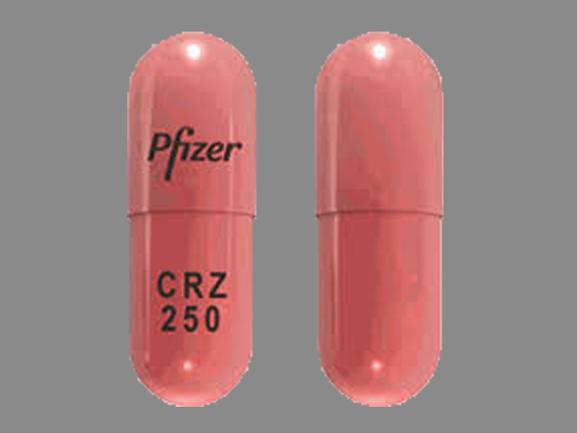Xalkori Disease Interactions
There are 7 disease interactions with Xalkori (crizotinib).
- Bradycardia
- Gastrointestinal perforation
- Hepatic impairment
- ILD/pneumonitis
- QT prolongation
- Renal impairment
- Visual loss
Crizotinib (applies to Xalkori) bradycardia
Moderate Potential Hazard, Moderate plausibility. Applicable conditions: Arrhythmias
Crizotinib can cause symptomatic bradycardia. Heart rate and blood pressure should be monitored regularly. It is recommended to withhold, reduce dose, or permanently discontinue crizotinib for bradycardia as recommended.
Crizotinib (applies to Xalkori) gastrointestinal perforation
Moderate Potential Hazard, Moderate plausibility. Applicable conditions: Diverticulitis, Gastrointestinal Obstruction
The use of crizotinib can cause gastrointestinal (GI) perforations. This drug should be used with caution in patients at risk for GI perforation (e.g., history of diverticulitis, metastases to the gastrointestinal tract, concomitant use of medicinal products with a recognized risk of gastrointestinal perforation). It is recommended to discontinue treatment in patients who develop GI perforation.
Crizotinib (applies to Xalkori) hepatic impairment
Moderate Potential Hazard, Moderate plausibility. Applicable conditions: Liver Disease
Crizotinib concentrations increased in patients with preexisting moderate (any AST and total bilirubin greater than 1.5 to 3 times the upper limit of normal [1.5 to 3 x ULN]) or severe (any AST and total bilirubin greater than 3 x ULN) liver dysfunction; a reduced dosage of crizotinib is recommended in these patients. Caution is recommended in patients with moderate or severe liver dysfunction. No dose adjustment is recommended in patients with preexisting mild liver dysfunction (AST greater than ULN and total bilirubin up to 1 x ULN or any AST and total bilirubin greater than 1 to 1.5 x ULN).
Cases of drug-induced hepatotoxicity with fatal outcomes have been reported with the use of crizotinib. It is recommended to monitor liver function tests (including ALT, AST, total bilirubin) every 2 weeks during the first 2 months of therapy, then once a month, and as clinically indicated, with more frequent repeat testing for increased liver transaminases, alkaline phosphatase, or total bilirubin in patients who develop increased transaminases. It is recommended to withhold, reduce dose, or permanently discontinue crizotinib for hepatotoxicity as recommended.
Crizotinib (applies to Xalkori) ILD/pneumonitis
Moderate Potential Hazard, Moderate plausibility. Applicable conditions: Interstitial Pneumonitis, Pulmonary Impairment
Severe, life-threatening, or fatal interstitial lung disease (ILD)/pneumonitis can occur with crizotinib. Care should be exercised when using this drug in patients with preexisting pulmonary impairment. Patients should be monitored for pulmonary symptoms indicative of ILD/pneumonitis. Crizotinib should be permanently discontinued in patients diagnosed with drug-related ILD/pneumonitis if no other potential causes of ILD/pneumonitis have been identified.
Crizotinib (applies to Xalkori) QT prolongation
Moderate Potential Hazard, Moderate plausibility. Applicable conditions: Arrhythmias, Electrolyte Abnormalities, Congestive Heart Failure
The use of crizotinib can cause QTc prolongation. It is recommended to avoid the use of this agent in patients with congenital long QT syndrome. Care should be exercised when using this drug in patients with a history of or predisposition to QTc prolongation. ECGs and electrolytes should be monitored in patients with congestive heart failure, bradyarrhythmias, electrolyte abnormalities, or who are taking medications that prolong the QT interval. It is recommended to withhold, reduce dose, or permanently discontinue crizotinib for QT/QTc interval prolongation as recommended.
Crizotinib (applies to Xalkori) renal impairment
Moderate Potential Hazard, Moderate plausibility. Applicable conditions: Renal Dysfunction
The exposure to crizotinib is increased in patients with preexisting severe renal dysfunction (CrCl less than 30 mL/min [calculated using the modified Cockcroft-Gault equation for adult patients and the Schwartz equation for pediatric patients]) not requiring dialysis; a reduced dosage of crizotinib is recommended in these patients. Care should be exercised when using this drug in patients with severe renal dysfunction not requiring dialysis. No dose adjustment is recommended in patients with mild to moderate renal dysfunction (CrCl 30 to 89 mL/min).
Crizotinib (applies to Xalkori) visual loss
Moderate Potential Hazard, Moderate plausibility. Applicable conditions: Visual Defect/Disturbance
Cases of optic atrophy and optic nerve disorder leading to vision loss have been reported with the use of crizotinib. Assessment of visual symptoms for all patients is recommended monthly during therapy; new visual symptoms should be reported to an eye specialist. For pediatric and young adult patients with anaplastic large cell lymphoma or inflammatory myofibroblastic tumor, baseline and follow-up ophthalmologic examinations (including retinal examination) should be obtained within 1 month of starting crizotinib and every 3 months thereafter. The ophthalmological evaluation should consist of best corrected visual acuity, retinal photographs, visual fields, optical coherence tomography (OCT), and other evaluations as appropriate. Crizotinib should be permanently discontinued for grade 3 or 4 ocular disorders or severe visual loss (best corrected vision less than 20/200 in 1 or both eyes) unless another cause is identified. There is insufficient information to characterize the risks of resumption of crizotinib in patients who develop visual symptoms or visual loss; a decision to resume treatment with crizotinib should consider the potential benefits versus risks to the patient.
Switch to professional interaction data
Xalkori drug interactions
There are 821 drug interactions with Xalkori (crizotinib).
Xalkori alcohol/food interactions
There is 1 alcohol/food interaction with Xalkori (crizotinib).
More about Xalkori (crizotinib)
- Xalkori consumer information
- Check interactions
- Compare alternatives
- Pricing & coupons
- Reviews (5)
- Drug images
- Side effects
- Dosage information
- During pregnancy
- FDA approval history
- Drug class: multikinase inhibitors
- Breastfeeding
- En español
Related treatment guides
Drug Interaction Classification
| Highly clinically significant. Avoid combinations; the risk of the interaction outweighs the benefit. | |
| Moderately clinically significant. Usually avoid combinations; use it only under special circumstances. | |
| Minimally clinically significant. Minimize risk; assess risk and consider an alternative drug, take steps to circumvent the interaction risk and/or institute a monitoring plan. | |
| No interaction information available. |
See also:
Further information
Always consult your healthcare provider to ensure the information displayed on this page applies to your personal circumstances.


